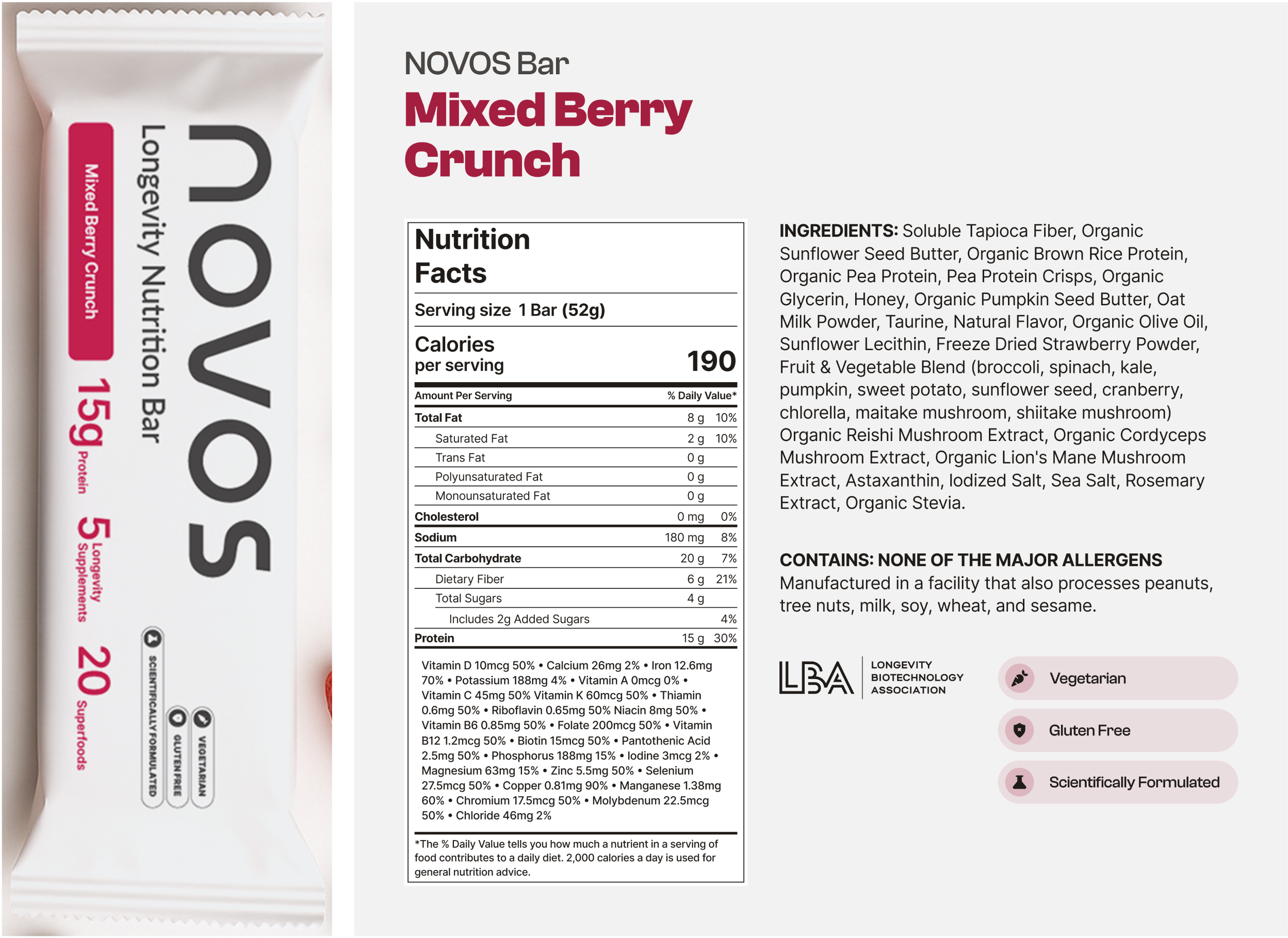For over 20 years, ‘healthy aging’ or ‘senior nutrition’ has been part of the strategies of many food and beverage companies, but successes have been few and failures many. With a major shift in demographics under way, understanding the dynamics of healthy aging, and how to create successful brands, is about to become more important than ever.
In the US, a supplements business is dipping its toes into the food sector by launching what it claims is “The first and only longevity bar”. Sold by Novos Labs, which has been selling a range of supplements for healthy aging since 2018, the bars have been developed by a longevity researcher, a dietitian and a Michelin-star chef and were launched in July 2025.
“Longevity can seem complicated, but the real goal is making consistent, everyday healthy choices. NOVOS makes it even easier, convenient, and more accessible,” says Brooke Alpert, the dietitian that was involved in the product development. “This bar blends the latest science with natural, whole-food ingredients to help people stay on track – even when life gets hectic.”
Novos Bar comes in three flavours: Salted Chocolate Crunch, Mixed Berry Crunch, and Peanut Butter Chocolate Chip Crunch. One bar contains 190-220 kcal, 8-10 grams of fat, 20 grams of carbohydrates and 15 grams of protein, along with 20 superfoods and 5 ingredients that the company calls “longevity supplements”. It doesn’t specify what those supplements and superfoods are, but the ingredient list features things like shiitake mushroom, broccoli, kale, reishi, taurine, cordyceps and lion’s mane.
The protein used is a mix of rice and pea. This is highly intentional, with Novos saying that whey protein contains the amino acids methionine and isoleucine, which it claims has been associated with shortened lifespan in several animal studies.

Looking at marketing messaging, there is no shortage of big, bold statements. Novos promotes its bars as “the healthiest nutrition bar ever created” and claims that they are “smarter than your healthiest meal”. The brand is careful to point out that it is rooted in science and its website features a wide range of graphics and in-depth information about what makes the bars unique, the reasoning behind the ingredients, and how to use them for the best results.
Consumers are advised to have 1 or 2 bars per day, which would entail a significant cost of $4-8 per day (slightly less if you opt for the subscription option), and the brand’s “Timeline of bar benefits” promises anything from fewer cravings to better recovery, sharper focus, more stamina and better skin health within the first month of consumption. The bars are further said to help build lean muscle, improve metabolism and “target causes of aging”.
Whether Novos will be able to find enough consumers willing to fork out $100-200 per month on snack bars remains to be seen. While healthy ageing tends to be a high value, low volume segment where consumers are generally prepared to pay premium prices for a product they believe and feel the benefit of, they too will have a limit of how much they are prepared – and able – to spend.
Another potential challenge for Novos is that it appears to target consumers who may not yet have started to feel the physical effects of ageing. Novos’ founder Chris Mirabile is 41 years old and the brand’s social media material tends to feature consumers in their 30s or 40s. The most-likely-to-buy target age-groups for healthy ageing products are from about age 50-55 up to about age 70. Thinking that consumers will start consuming products with specific health benefits when they are younger, as a preventative measure for later life, is a trap that many brands have walked into but it has almost always produced disappointing sales results.

